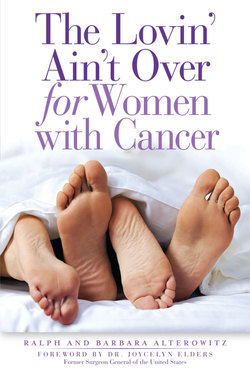Читать книгу The Lovin' Ain't Over for Women with Cancer - Ralph Alterowitz - Страница 28
На сайте Литреса книга снята с продажи.
Depression
ОглавлениеEarly in the relationship, I was satisfied probably 85% of the time. Now I’m not satisfied. I’ve been on depression medicine. I keep hoping it’s that. My doctor changed my medicine. He says, “Maybe this one will work.”
Brenda
Depression occurs in about one in four women with cancer, twice the rate of the general population. Depression and anxiety are closely related, since they can be promoted by similar conditions such as the diagnosis of a severe and possibly life-threatening illness and the presence of unpleasant symptoms, such as pain, nausea, and fatigue. In addition, there are the worries about changes in life plans, quality of life, and disease recurrence.
Depression or anxiety may also be a side effect of some treatment, such as high-dose interferon therapy. Studies have shown that heightened anxiety and depression may last months or even years following successful treatment. Jed Diamond (Male Menopause) notes one of the differences between female and male depression is that the woman constantly wonders, “Am I loveable enough?” whereas the man wonders, “Am I being loved enough?” With love so closely associated with a woman’s figure and sex in their minds, most women treated for breast and female cancers ask themselves questions similar in nature.
It is neither unusual nor shameful to become depressed when you have cancer. If you think you might be suffering from depression, seek professional help. It can markedly improve your quality of life.
Anti-depressants have helped millions of people. But like all medications, each one will work better on some people than on others, because our bodies and metabolisms are different. According to Dr. Robert Hedaya, a leading psychopharmacologist and clinical psychiatrist, “[Only] 60 to70 percent of patients respond to even the most effective medications…Thus, antidepressant medications actually can be said to relieve only 50 percent of the symptoms in 60 to 70 percent of patients.” Therefore, it benefits patients to try and find one that works well for them.
Assessing whether an anti-depressant has the desired effect must be done in the context of the patient’s behavior and habits. Dr. Hedaya notes that “Caffeine, sugar, and alcohol are the three biggest saboteurs of antidepressants. They wreak havoc on your moods, energy levels, and weight…” Therefore, the first step is to assess whether you are doing anything that could prevent the drug from helping you.
Complicating the intimacy picture for post-cancer therapy patients is that a major side effect of most antidepressants is sexual dysfunction. Women may experience reduced libido. They may sense some numbness or reduced sensitivity in the genital area when they are touched, and thus take a longer time to reach orgasm. Some will fail to reach orgasm at all. Since these patients may have emerged from therapy with sexual problems in the first place, antidepressant treatments only compound these problems. So what can the patient do?
The first step is a discussion with your doctor about alternative anti-depressants with fewer sexual side effects. A possible option to discuss is the Bupoprion class of antidepressants, which has been found to have the lowest incidence of negative sexual side effects, and sometimes even to have positive sexual effects. Chapter 12 has more detail on this class of antidepressants. Often, women have to try several different antidepressants before they find one that works against depression and does not cause sexual problems. As always, any decision on medication changes must be made with your doctor.
Complementing your medication, perhaps even as an alternative to medication with your health care provider’s counsel, are techniques such as visualization and meditation, addressed briefly in Chapter 11, that can help you improve your mind-body balance.
